It doesn’t exactly look ground-breaking.
A £1.99 pack of 20 teabags containing a herbal infusion of chamomile, spearmint and rosehip seed.
Yet the recent launch of this Wind Down Infusion under Tesco’s own label has caught the attention of industry experts, who see it as an important milestone in the development of functional food and drink in the UK.
So what’s so special about it?
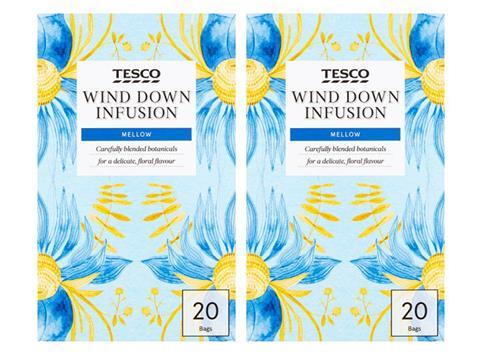
It’s all in the name. The words ‘wind down’ suggest a positive impact on mood and emotional wellbeing in a more direct way than we’ve seen with many other functional products to date – particularly in own label. (A second infusion in the range, called Get Set, conveys similar mood-boosting benefits.)
Discover the best in own-label NPD with The Grocer Own-Label Accreditation Scheme
While functionality linked to physical benefits, such as improved digestion, has long been a trend in UK grocery, linking food and drink consumption with mood is a relatively new frontier.
Though there are EU-approved health claims relating to mood and emotional wellbeing for a number of vitamins and minerals, such as vitamin B1 (thiamine), B12 and vitamin C, experts at Lumina Intelligence say functional foods with mood-specific benefits are still “pretty niche”.
However, more claims are being investigated all the time, including for probiotics, milk and cocoa.
Of these, claims related to the probiotics and the gut-brain axis look like a particularly interesting opportunity for food and drink producers, says Ewa Hudson, head of market insights at Lumina. In some markets, such as Germany, consumers can already buy probiotics supplements that promise to relieve stress.
Wellness boom

These kinds of claims are, of course, a more serious proposition than using the words ‘wind down’ on a herbal infusion, but they tap similar consumer trends.
Buoyed by the wider ‘wellness’ and ‘self-care’ movements, the role of food and drink in affecting mood is an area of growing interest to brands and retailers – both in terms of direct functional claims (the kinds that would require EFSA approval) and softer links between food and mood.
In its global food & drink trend outlook report for 2018, Mintel picked mood-specific or emotional benefits as one of its top five trends.
Examples already in the market include a handful of branded products targeting stress relief and relaxation (such as Clipper’s Sleep Easy tea) and this recent Sainsbury’s launch, as well as Mellow Mood relaxation teas from The Marley Beverage Company, which are sold in the US.
Elsewhere, London’s High Mood Café offers gut-friendly and mood-boosting fare (there’s that gut-brain axis again), while the now-defunct Monarch Airlines experimented with a mood-boosting in-flight menu.
Opportunity for tea

UK shoppers are increasingly interested in using food and drink to boost their mood, says Amy Price, senior food & drink analyst at Mintel. This is particularly true in the tea category, where much of the mood-enhancing NPD has been focused to date.
“Naturally functional drinks are becoming ever more relevant, with tea consumers continuing to show interest in products that can target specific ailments and provide diverse functions, from energy-boosting to relaxation,” says Price.
The new Tesco launch is perfectly positioned to take advantage of this, she suggests.
“The wording of the claims of the Tesco products such as ‘wind down’ and ‘get set’ is fresh and different, which is set to resonate among younger consumers aged 16-34, who show above-average usage of fruit/herbal, green or specialty black teas.”
It’s not all about teas and herbal infusions, though. With gut health a growing trend and more research into gut-brain links pending, gut-friendly NPD such as kombucha or kefir could present a big opportunity for more mood-specific claims in the future.
Expect more brands and retailers to follow Tesco and start becoming bolder about mood-specific claims in the months ahead.
Read more: The Grocer’s functional food & drink category report 2018

Julia frequently appears on radio and TV as a commentator on grocery retail and the politics of food and food sourcing, and has worked extensively on food authenticity and fraud issues. In 2013, she headed up The Grocer’s coverage of the horsemeat scandal.
Prior to joining The Grocer in 2010, Julia was editor of New Media Markets, a trade publication for the TV industry. She started her career as a staff writer for The Legal 500 at publisher Legalease. @juliaglotzView full Profile













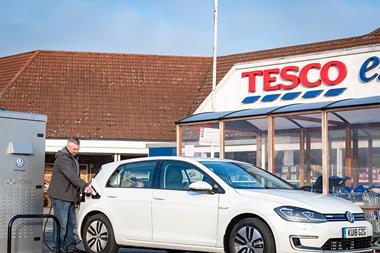

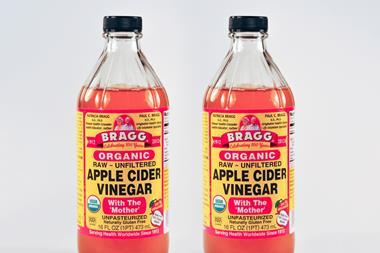
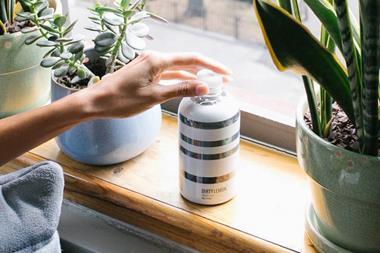
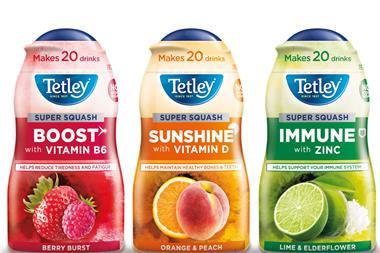

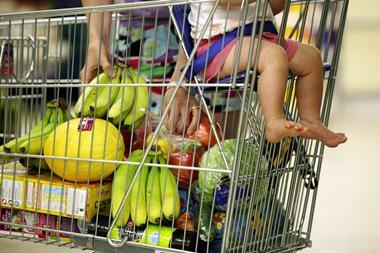




1 Readers' comment